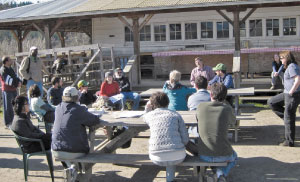Sno-Valley Tilth nurtures new farmers
by Erick Haakenson
This article was originally published in May 2011

There are a variety of reasons many of us want to eat locally sourced food. But the fulfillment of that desire is based on the existence of a local food supply.
It’s been estimated that only about 2 percent of food consumption in the greater Seattle area is sourced locally. That’s not a hard number but it is indicative of what people in the food industry and many consumers know: demand for local food exceeds the supply.
As a farmer in the Snoqualmie Valley for more than 20 years, I can tell you that this valley could produce a great deal more food. Why doesn’t it?
Land use in our valley is impacting the growth of agriculture here. Our farmlands are being sought by those who want to establish recreational facilities or estate-residences on land that is designated for agricultural production.
A county council committed to the preservation of farmland could encourage agricultural production immeasurably without spending a penny; it only would have to clarify and uphold existing codes that require land in Agricultural Production Districts (APDs) to be used for agricultural production, and distinguish between recreation and agricultural production.
Without political action, farmland will continue to reflect non-agricultural land use and become unaffordable for farmers.
Given this reality, is there anything we can do to promote more production?
Yes. We can increase the supply of local, organic produce by increasing the number of local farms. The organization of organic farmers in the Snoqualmie Valley — Sno-Valley Tilth (SVT) — is doing this through its Mentoring Program.
There are many groups working to help people who want to farm. We applaud them all but see our efforts to be somewhat different. Our goal is to help people who are ready to farm find available land, and to connect each new farmer with a successful, nearby farmer who will serve as a mentor.
Finding good, available farmland is not easy for people new to farming. They often don’t know where to look, or what to look for. None of us who farm in the valley know all the farmland, but most of us know our own area pretty well — where the best farmland is, what’s used and what isn’t. Consequently, we farmers can help new farmers find leasable land to start farming.
Farmers also are uniquely qualified to provide the kinds of information that new farmers really need to know to succeed. There is a lot of information available through classes or on the Web. But nothing is quite as valuable to a new farmer as an experienced neighbor who is doing successfully what the new farmer wants to learn to do.
There’s no need to reinvent agricultural wheels. The voice of experience can be an invaluable asset as a new farmer undertakes his or her first season.
This is the second year of our Mentoring Program. Last year, four new farmers started the program. One dropped out almost immediately because of family issues, but has stayed in close contact and still expects to start farming at some point. A second couple ended up doing a very small-scale farming project.
The two others both did extremely well and are farming again this year on significantly larger scales. One had just taken a degree in IT, and after last year decided to pursue farming full-time rather than look for a job in the technology sector.
We’re looking forward to building the Mentoring Program this year. There is no charge to the new farmer. This service is part of the outreach of SVT, whose mission is to help promote local, organic farming.
If you or someone you know has an interest in starting an organic farm, or if you have farmland to lease, please contact Erick Haakenson at jubileefarm@hotmail.com. To learn more about SVT, see snovalleytilth.org.
Erick Haakenson is a Sno-Valley Tilth board member and the owner and co-manager of Jubilee Farm in Carnation, Wash.
